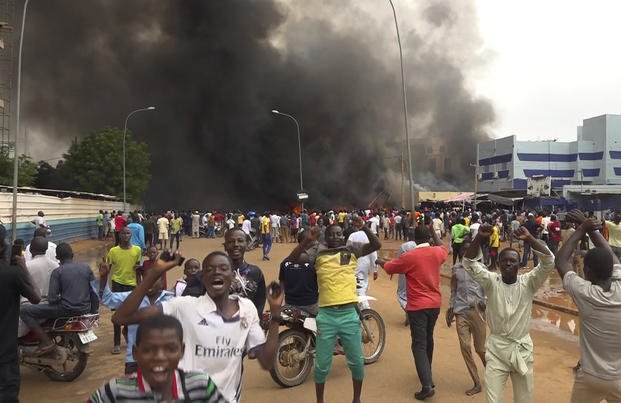COTONOU, Benin — French troops have started leaving Niger more than two months after mutinous soldiers toppled the African country’s democratically elected president, the military said Wednesday.
More than 100 troops left in two flights from the capital Niamey on Tuesday in the first of what will be several rounds of departures between now and the end of the year, said French military spokesman, Col. Pierre Gaudilliere. All are returning to France, he said.
Niger’s state television broadcast images of a convoy leaving a base in Ouallam in the north, saying it was bound for neighboring Chad, to the east.
The departure comes weeks after French President Emmanuel Macron announced that France will end its military presence in Niger and pull its ambassador out of the country as a result of the coup that removed President Mohamed Bazoum in late July. Some 1,500 French troops have been operating in Niger, training its military and conducting joint operations.
Also Tuesday, the junta gave the United Nations resident coordinator in Niger, Louise Aubin, 72 hours to leave the country, according to a statement from the Foreign Ministry. The junta cited “underhanded maneuvers” by the U.N. secretary-general to prevent its full participation in last month’s General Assembly in New York as one of the reasons.
The military rulers had wanted Niger’s former ambassador to the United Nations, Bakary Yaou Sangare, who was made foreign minister after the coup, to speak on its behalf at the General Assembly. However, Bakary did not receive credentials to attend after the deposed Nigerien government’s foreign minister sent the world body a letter “informing of the end of functions of Mr. Bakary as permanent representative of Niger to the United Nations,” said U.N. spokesman, Stephane Dujarric.
The U.N. did not immediately respond about the junta's demand for Aubin to leave.
Since seizing power, Niger’s military leaders have leveraged anti-French sentiment among the population against its former colonial ruler and said the withdrawal signals a new step towards its sovereignty.
The United States has formally declared that the ousting of Bazoum was a coup, suspending hundreds of millions of dollars in aid as well as military assistance and training.
Niger was seen by many in the West as the last country in Africa's Sahel region — the vast expanse south of the Sahara Desert — that could be partnered with to beat back a growing jihadi insurgency linked to al-Qaida and the Islamic State group. French troops have already been ousted by military regimes in neighboring Mali and Burkina Faso, which are seeing a surge in attacks.
Analysts warn that France's withdrawal will leave a security vacuum that extremists could exploit.
“French forces might not have defeated these groups, but at least disrupted and limited their activities, said said Rida Lyammouri, senior fellow at the Policy Center for the New South, a Moroccan-based think tank.
With the French out of the picture, these will likely "expand to areas where French forces were providing support to Nigerien forces, especially on the borders with Mali and Burkina Faso,” Lyammouri said.
Violence has already spiked since the coup. In the month after the junta seized power, violence primarily linked to the extremists soared by more than 40%, according to the Armed Conflict Location & Event Data Project.
Jihadi attacks targeting civilians quadrupled in August, compared with the month before, and attacks against security forces spiked in the Tillaberi region, killing at least 40 soldiers, the project reported.
___
Associated Press writer Angela Charlton in Paris contributed to his report.












